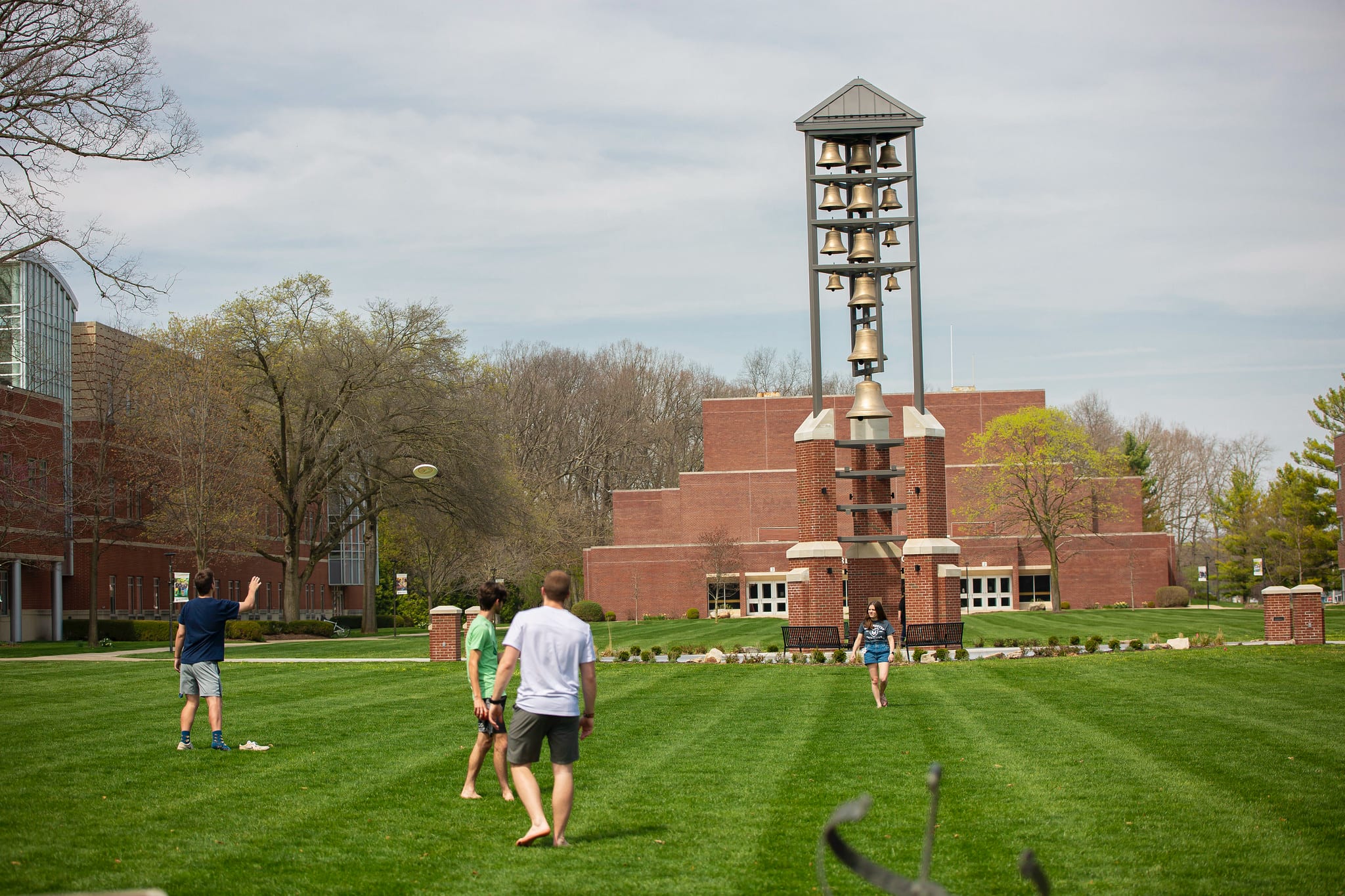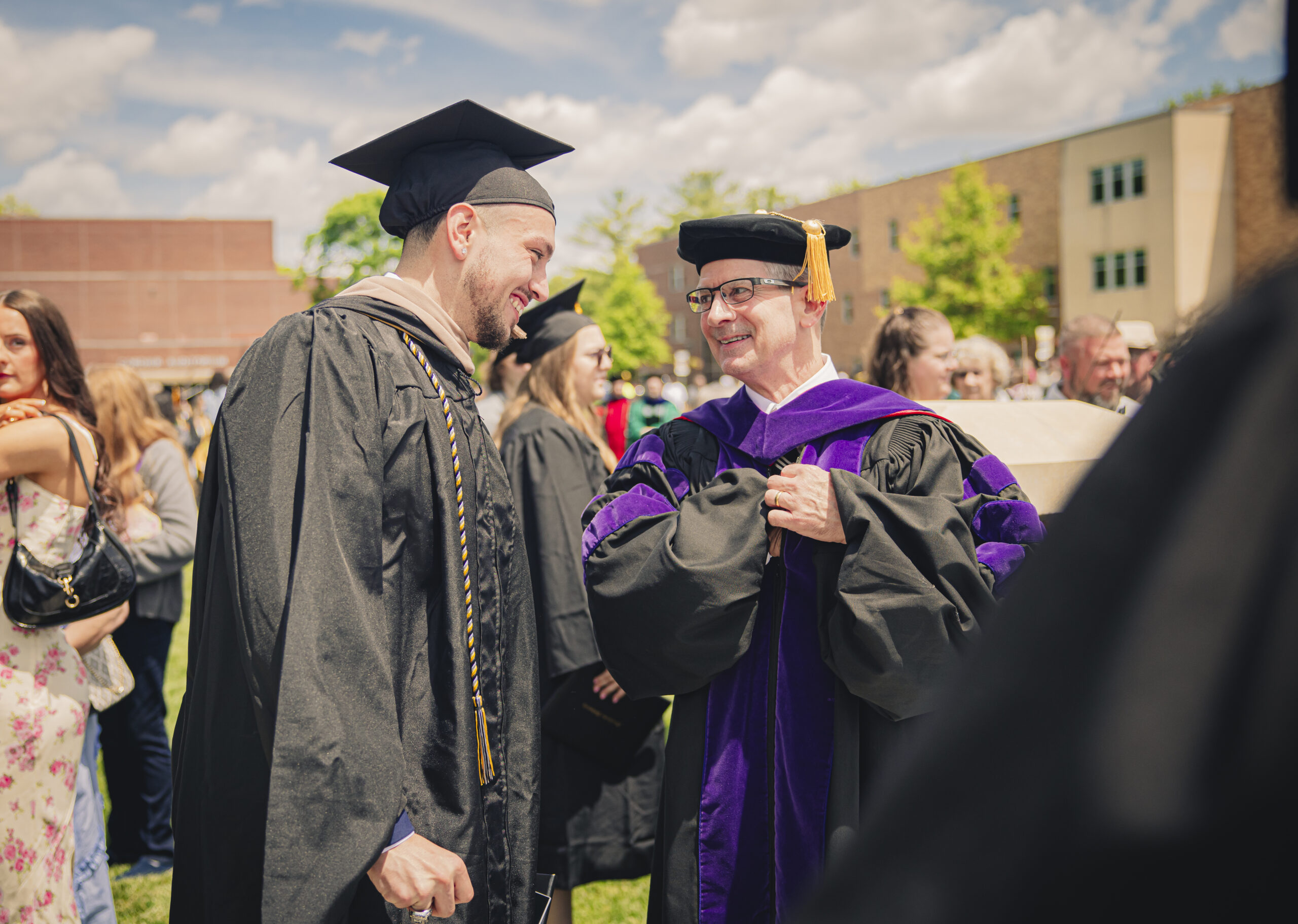Psychology
Explore how the mind works with a bachelor degree in psychology from Manchester University. Gain hands-on experience, conduct research, and build skills for careers in mental health, education, or human services. Small class sizes and faculty mentoring help you thrive in both graduate study and professional roles.

Explore the Mind: Earn Your Bachelor Degree in Psychology or Minor at Manchester University
At Manchester University, students in psychology programs explore how environment, brain function, and behavior intersect. The curriculum emphasizes the typical course of human development and includes options to concentrate in cognitive neuroscience or industrial-organizational psychology or major in Counseling, a joint major with the Department of Philosophy and Religious studies. Students gain foundational knowledge in psychological research methods, an appreciation for related behavioral sciences, and preparation for graduate school or careers in mental health, education, business, or human services.
Program Information:
Major | BS
- 42-44 Credit Hours
Minor
- 19 Credit Hours
Minor | Cognitive Neuroscience
- 20 Credit Hours
Minor | I-O Psychology
- 18-20 Credit Hours
Location
- North Manchester

Hannah Glenn ’16, Psychology Major, Ph.D.
Why Choose MU for Psychology?

Hands-On Experience from Day One
Diverse Career Concentrations
With concentrations in Cognitive Neuroscience and Industrial-Organizational Psychology as well as a joint major in Counseling with the Philosophy & Religious Studies Department, MU students tailor their education to align with evolving goals and graduate school ambitions.
Psychology Pathway for High School Students
The Manchester Early College Experience allows high school students to earn psychology credit on campus or online, giving them a head start toward careers in therapy, social work, or education.
What You Can Do with Your Bachelor’s Degree in Psychology
Mental Health Counselor
Help individuals manage emotional and behavioral challenges through therapy.
Industrial/Organizational Psychologist
Apply psychology in workplace settings to improve productivity and morale.
Substance Abuse Counselor
Support recovery by treating addiction and behavioral health disorders.
School Psychologist
Promote student success through mental health and learning assessments.

Average Starting Salary for Psychology Degree Holders
Salaries for psychology graduates vary widely depending on education level, specialization, experience, and location. According to national data:
-
Mental health, substance abuse, and behavioral disorder counselors have a median annual wage of about $59,190 (May 2024).
-
Psychologists generally have a median annual wage of about $94,310 (May 2024).
A degree in psychology from Manchester University provides a strong foundation for careers in education, healthcare, business, and non-profit sectors. Many graduates start in roles like counseling, human services, or social work, and those who pursue advanced degrees can move into higher-paying or more specialized positions over time.

How the Psychology Program Supports Your Growth
Student Research, Labs, and Graduate Success
Manchester University’s Psychology program empowers students to achieve professional and academic excellence through rigorous undergraduate research and access to advanced lab technologies. All psychology majors participate in research design and statistical analysis coursework, often continuing into faculty-mentored projects that are presented at conferences such as:
- Midwest Psychological Association (MPA)
- Society for Neuroscience (SfN)
- Butler Undergraduate Research Conference
- Manchester-Bluffton-Goshen Symposium
- Manchester University Student Research Symposium
Manchester offers two primary research environments:
- The Behavioral Lab focuses on reaction time, attention, and visual memory.
- The Stimulation Lab applies transcranial direct-current stimulation (tDCS) to explore neural function and cognition. Students actively engage in the full research process—from experiment design to data presentation—and many are published or co-author peer-reviewed journal articles.
Psychology majors have gone on to pursue graduate degrees in clinical psychology, neuropsychology, art therapy, counseling, and school psychology at institutions such as Ball State, Valparaiso, and the University of Texas. Notably, alumni like Jessica Bostic ’15 have published with faculty and received external grants for their work. Others, like Hannah Glenn ’16, have secured research analyst roles at prestigious neuroscience labs.
With a commitment to faculty support and early access to research tools, Manchester’s Psychology program ensures that students graduate with strong portfolios, real-world experience, and a competitive edge for graduate school or employment.
Course Highlights in the Psychology Major
Manchester University’s psychology program gives students a strong foundation in psychological science while offering the flexibility to explore areas of personal and professional interest. Students take a combination of core courses and electives designed to build both research and applied skills.
Courses like Developmental Psychology, Behavior Disorders, and Organizational Psychology help students understand human behavior across the lifespan, in clinical contexts, and within workplace environments. Advanced coursework in cognitive neuroscience, psychological testing, and counseling-related topics is also available for those pursuing specialized interests or career paths.
Whether students plan to enter graduate school or begin working right after graduation, Manchester’s psychology curriculum supports critical thinking, research design, and hands-on learning skills essential for success in psychology-related careers.
Hands-On Learning & Field Experience
Psychology majors at Manchester University benefit from a variety of experiential learning opportunities that prepare them for graduate study and the workforce. All students complete a practicum or field placement, gaining firsthand experience in clinics, hospitals, schools, social service agencies, or research labs. Opportunities also include presenting at professional psychology conferences, engaging in directed research under faculty mentorship, or contributing to campus mental health initiatives.
Students also participate in service-learning projects that connect psychological concepts to real community needs. These experiences are built into the curriculum, from introductory courses to the senior seminar, helping students develop professionalism, cultural competency, and communication skills in real-world contexts. Psychology majors often explore topics such as conflict mediation, mental health advocacy, or behavioral analysis through their placements.
Fieldwork not only enhances classroom learning but also helps students develop critical interpersonal and career-specific skills—interviewing, observation, and therapeutic listening among them. These skills are documented through senior portfolios that include a resume and graduate school or job application materials. With faculty guidance and professional support, students graduate with practical tools and meaningful experiences that help launch careers in psychology, counseling, education, and more.
Co-Curricular Activities & Campus Involvement
Psychology majors at Manchester University have a wide range of co-curricular opportunities designed to enhance both academic and professional development.
Psi Chi, the International Honor Society in Psychology, recognizes outstanding academic achievement and fosters student involvement in research, service, and leadership. Eligible students are invited to join this prestigious organization and participate in a variety of scholarly and service-oriented initiatives.
Psych Society is a campus group that hosts events, invites guest speakers, and organizes service projects focused on mental health awareness and the application of psychological science. These organizations help psychology majors build community, strengthen leadership skills, and explore emerging issues in the field.
Outside of discipline-specific groups, psychology majors are encouraged to participate in campus-wide activities such as wellness initiatives, peer listening teams, and diversity and inclusion workshops, which offer real-world contexts to apply psychological principles.
Many students also serve in the classroom as teaching assistants, lab aides, or peer mentors, gaining experience in communication, organization, and research.
A standout feature of Manchester’s academic calendar is the January Session, which offers immersive courses—often involving travel or service learning. Psychology students have traveled to destinations like France, Jamaica, and Hawaii to explore topics such as cross-cultural psychology and global mental health.

These co-curricular experiences support Manchester’s program goals in ethical leadership, cultural competency, and applying psychological theory to real-world challenges—all while helping students build strong resumes and a deeper sense of purpose.
Internships & Career Preparation
Manchester University’s Psychology program emphasizes the importance of real-world experience through internships that support long-term career success. With the help of MU Career Services and resources from the American Psychological Association (APA), students can explore competitive internships and research opportunities at hospitals, schools, nonprofits, government agencies, and private clinics.
The program regularly connects students to:
- APA listings for undergraduate internships in research and clinical psychology
- Manchester’s Career and Internship Fair, which brings employers to campus
- One-on-one advising to help secure placements aligned with students’ goals
Featured Internship: Genesis Malin, Senior Psychology Major
Genesis works as a Youth Treatment Specialist at Pierceton Woods Academy, where she supports adolescents in completing treatment and preparing for independent living. “I enjoy seeing the impact that I make in these residents’ lives. The changes in their behaviors, values, and the way they carry themselves drastically changes… It is great to be a part of turning someone’s life around.”Genesis found this internship through a peer recommendation and a connection made at Manchester’s Career Fair. Her experience has shaped her future goal: to work with incarcerated individuals, helping them re-enter society with the resources and support systems needed to succeed.
Psychology students at Manchester complete internships that often become direct stepping stones into careers in counseling, social work, criminal justice, and human services. These placements not only provide professional experience but also reinforce classroom learning in communication, behavior management, and therapeutic support.
Meet the Faculty
FAQs About Manchester University’s Psychology Degree
What can I expect from the bachelor degree in psychology at Manchester University?
Through small classes and expert faculty mentorship, psychology majors gain hands-on experience in research labs, mental health settings, and human services agencies. These opportunities allow undergraduate students to apply theoretical perspectives and psychological principles in real-world contexts. Whether you plan to pursue a career in clinical psychology, counseling psychology, or industrial organizational psychology, the program equips you with research skills, critical thinking skills, and communication skills that are essential for success.
Many psychology majors go on to earn a master’s degree or graduate degree in specialized fields, including health psychology or the criminal justice system. The bachelor’s program at Manchester not only prepares students for a wide range of career paths but also builds a strong foundation for those interested in becoming a clinical psychologist or entering other psychology-focused graduate programs.
What concentrations are available in the Psychology major?
Manchester University’s psychology degree offers specialized concentrations that help undergraduate students personalize their learning experience. In addition to the general psychology track, psychology majors can pursue concentrations in cognitive neuroscience, industrial organizational psychology, or psychology & religious culture. Each of these options expands on traditional undergraduate courses while preparing students for unique career paths.
The Cognitive Neuroscience concentration emphasizes psychology research methods and the biological underpinnings of human behavior and mental processes. Students study brain function and neuropsychological disorders, often preparing for careers in neuroscience, medicine, or graduate programs.
The Industrial-Organizational Psychology track focuses on human resources, employee satisfaction, and workplace behavior. Students gain hands-on experience that prepares them for roles in business, consulting, and organizational leadership.
The joint major in Counseling with the Philosophy & Religious Studies Department explores the intersection of psychological development, faith, and social justice. It’s ideal for students interested in counseling psychology, ministry, or community service.
These concentrations allow psychology majors to tailor their academic journey based on their interests and career goals. Whether preparing for a master’s degree program, exploring potential careers in human services, or diving into social psychology, Manchester’s curriculum is designed to prepare students with both foundational knowledge and practical skills for success.
Is hands-on experience part of the psychology program?
Yes—hands-on experience is a cornerstone of the psychology program at Manchester University. Every psychology major participates in experiential learning designed to expose students to practical applications of psychological theory. From internships to practicums and research labs, these opportunities help build research skills, critical thinking, and communication skills that prepare students for a wide range of potential careers.
Students may work in hospitals, schools, nonprofit organizations, or even correctional institutions, gaining experience in areas like mental health services, human behavior assessment, or educational instruction. Whether your goal is to become a clinical psychologist, enter the field of criminal psychology, or pursue counseling psychology, Manchester’s psychology degree program ensures you graduate with real-world experience.
Students also conduct faculty-mentored research projects that align with their interests in clinical psychology, social psychology, or health psychology. These projects often become part of a professional portfolio used when applying for a graduate degree or master’s degree program.
Beyond coursework, psychology majors develop professional relationships and build résumés through fieldwork and service-learning initiatives. These experiences are particularly beneficial for students seeking entrance into graduate programs or looking to enter careers in mental health, human services, or research immediately after earning their bachelor’s degree in psychology.
What career opportunities are available with a psychology degree?
A psychology degree from Manchester University opens the door to many rewarding career opportunities. With a foundation in human behavior, communication skills, and research methodology, psychology majors are well-prepared for positions in mental health, education, business, and social services.
Many students pursue careers as mental health counselors, school psychologists, or case managers. Those with interests in the business world may work in human resources or organizational consulting, applying principles of industrial organizational psychology to improve workplace dynamics. Others choose paths in counseling psychology or clinical psychology, often advancing to a master’s degree or graduate degree program to deepen their expertise.
Graduates can also pursue careers in nonprofit management, social justice advocacy, or research. Community service managers and public relations specialists benefit from the psychology program’s emphasis on interpersonal and critical thinking skills.
Students who aim to become clinical psychologists or researchers may continue into doctoral or master’s degree programs. Manchester provides advising and support throughout the process, helping students connect coursework and field experience to long-term career goals. This combination of academic rigor, experiential learning, and career guidance ensures that psychology majors are well-equipped to pursue meaningful careers or continue their higher education journey.
Can I combine psychology with another major or minor?
Absolutely. Many psychology majors at Manchester University combine their psychology degree with a second major or minor to broaden their career opportunities and enrich their academic journey. Popular combinations include sociology, public relations, business management, peace studies, communication, and biology.
This interdisciplinary approach enhances students’ understanding of human behavior across different fields and strengthens their preparation for potential careers in clinical psychology, human services, education, and even the criminal justice system. For example, pairing psychology with public relations can lead to roles in corporate communication or nonprofit outreach. Similarly, a combination with biology may support students preparing for health psychology or neuroscience graduate programs.
The flexibility of Manchester’s curriculum allows undergraduate students to pursue additional minors without significantly extending their time to degree completion. This is particularly beneficial for students planning to pursue graduate school, as it demonstrates a commitment to diverse academic interests and professional relationships.
Whether you want to deepen your research skills, prepare for a master’s degree program, or gain insight into psychological principles through another discipline, Manchester’s program structure supports and encourages customization to align with each student’s individual goals and interests.
What are the benefits of earning a psychology degree at a liberal arts university like Manchester?
Earning a psychology degree at a liberal arts university like Manchester University offers students a uniquely well-rounded educational experience. Unlike larger institutions, Manchester emphasizes personal attention, small class sizes, and strong faculty-student mentorship. This approach supports both academic excellence and the development of soft skills—such as ethical reasoning, communication, and critical thinking—that are essential across many psychology career paths.
Students enrolled in Manchester’s bachelor’s degree program in psychology benefit from a curriculum that includes both general education and advanced psychology courses. These courses explore everything from foundational theories of human behavior to specialized topics like cognitive neuroscience, social psychology, and industrial organizational psychology. Manchester’s liberal arts context encourages students to view psychological principles through interdisciplinary lenses such as peace studies, philosophy, or public relations.
Moreover, psychology majors at Manchester are encouraged to get involved in campus research labs, service-learning projects, and internships. These experiences expose students to hands-on training in counseling psychology, data analysis, and applied psychology research methods. The result? Graduates who are not only academically prepared but also professionally confident and socially aware.
Choosing to pursue your undergraduate degree at a liberal arts institution helps you build lasting relationships, expand your worldview, and prepare
What types of psychology courses will I take in the bachelor’s program?
The bachelor’s degree in psychology at Manchester University features a well-structured blend of core and elective psychology courses designed to expose students to all major areas of the field. From the first introductory course to advanced seminars, students build a strong foundation in psychological principles, human behavior, and research methodology.
Early in the bachelor’s program, students take PSYC 110: Introduction to Psychology, which introduces key topics such as memory, learning, motivation, and behavior disorders, therapy and counseling. As students progress, they move into mid-level courses like Developmental Psychology, Social Psychology, and Behavior Disorders. These psychology courses help students understand how individuals think, feel, and behave across the lifespan and in various social contexts.
Advanced options include specialized classes in evolutionary psychology, personnel psychology, and counseling theories. All students benefit from a strong research sequence of three statistics and methodology courses, during which they generate and present original research—building skills essential for both graduate school and careers in psychology-focused fields. Students interested in counseling or clinical psychology can select electives aligned with those disciplines or choose the interdisciplinary major in Counseling.
The combination of required and elective coursework within the psychology degree ensures that psychology majors graduate with deep subject knowledge and practical skills. This academic preparation supports successful entry into graduate degree programs, clinical roles, and various careers in human services and beyond.
Psychology Learning Outcomes
Program Learning Outcomes
Student Learning Outcomes:
- Evaluate concepts, principles, and theories in psychological science for a deeper understanding of behavior.
- Apply psychological content to solve practical problems.
2. Students will investigate psychological phenomena with the principles of scientific reasoning.
Student Learning Outcomes:
- Interpret, design, and evaluate psychological research.
3. Students will develop skills in self-regulation and communication to manage themselves, their work, and their interactions with others.
Student Learning Outcomes:
- Present psychological research and ideas in multiple formats and to different audiences.
Non-Discrimination in the Admission Process
Manchester University is committed to non-discrimination in campus life. The University does not discriminate on the basis of national origin, ancestry, race, color, age, sex, gender identity or expression, sexual orientation, familial status, religion, disability or veteran status in admissions or any area of campus life, including its educational programs, scholarships and loan awards, residence life programs, athletic programs, extracurricular programs, promotion and tenure policies and practice, and alumni affairs.
Manchester University is committed to carry out the provisions of Section 504 of the Rehabilitation Act of 1973 and the Americans With Disabilities Act, which provide for accessibility of University programs to the physically disabled.









